
Medical Mycology Journal
Scope & Guideline
Exploring Innovative Solutions for Fungal Pathogens
Introduction
Aims and Scopes
- Fungal Pathogenesis and Virulence Mechanisms:
Research exploring the mechanisms by which fungi cause disease, including studies on virulence factors, host-pathogen interactions, and environmental influences on fungal pathogenicity. - Antifungal Therapy and Drug Resistance:
Investigation into antifungal treatments, including optimal therapeutic strategies, drug resistance mechanisms, and the development of new antifungal agents. - Diagnostic Innovations in Mycology:
Focus on improving diagnostic methods for fungal infections, including molecular techniques, serological assays, and the identification of novel biomarkers for various fungal diseases. - Epidemiology of Fungal Infections:
Studies examining the distribution, prevalence, and trends of fungal infections in different populations, alongside the impact of environmental factors on fungal epidemiology. - Clinical Case Studies and Guidelines:
Publication of clinical case reports and evidence-based guidelines to inform practitioners about the diagnosis and management of fungal diseases. - Mycobiome Research:
Exploration of the human mycobiome and its association with health and disease, including the role of fungal communities in human microbiomes.
Trending and Emerging
- Antifungal Stewardship and Resistance Management:
There is a growing emphasis on antifungal stewardship programs aimed at optimizing antifungal use and managing resistance, reflecting global health priorities in combating fungal infections. - Role of Artificial Intelligence in Diagnostics:
Emerging research on the application of artificial intelligence in the diagnosis of fungal infections is gaining traction, indicating a trend towards integrating technology with clinical mycology. - In Vivo Models for Fungal Research:
Increased utilization of in vivo models, such as silkworm and murine models, for studying fungal infections and treatment efficacy suggests a trend towards more relevant experimental frameworks. - Molecular Epidemiology and Genomic Studies:
A rise in molecular epidemiology studies, including genomic analyses to understand the spread and resistance mechanisms of fungal pathogens, indicates a focus on precision medicine. - Exploration of Mycobiome and Associated Diseases:
Research into the human mycobiome and its implications for health and disease is emerging as a significant area of interest, highlighting the complex interactions between fungi and human health.
Declining or Waning
- Traditional Culture Methods for Fungal Identification:
There has been a noticeable decrease in studies focusing solely on classical culture methods for identifying fungal pathogens, as molecular techniques gain prominence in diagnostics. - Non-Specific Antifungal Agents:
Research centered on broad-spectrum antifungal agents is waning, with a shift towards more targeted therapies and personalized medicine approaches in antifungal treatment. - Basic Taxonomic Studies without Clinical Relevance:
Taxonomic research that does not have clear clinical implications or applications is becoming less common, as the journal increasingly prioritizes studies that bridge basic research and clinical practice. - Environmental Mycology Studies with Limited Clinical Application:
Research focused purely on environmental mycology, such as studies on fungal biodiversity without direct implications for human health, is appearing less frequently.
Similar Journals

SYDOWIA
Fostering Innovation in Botanical and Ecological ResearchSYDOWIA is a prestigious academic journal based in Austria, published by Verlag Ferdinand Berger Sohne Gesellschaft mbH, that has been a cornerstone of scientific publishing since its establishment in 1996. With an ISSN of 0082-0598, SYDOWIA focuses on critical research in the fields of Ecology, Evolution, Behavior and Systematics as well as Plant Science, earning a notable classification in Category Quartiles with Q3 in Ecology-related disciplines and Q2 in Plant Science for 2023. The journal’s strategic insights into agricultural and biological sciences have secured a place within the Scopus rankings, where it holds the position of #191 out of 516 in Plant Science and #278 out of 721 in Ecology categories—reflecting its growing influence with a percentile standing of 63rd and 61st, respectively. Although SYDOWIA is not an Open Access journal, it continues to thrive in delivering scholarly articles that promote advancement and innovation in ecological and botanical research. Researchers, professionals, and students alike can rely on SYDOWIA as a vital resource for disseminating knowledge and fostering exploration in these essential scientific domains.

MYCOSCIENCE
Bridging Science and Application in Fungal BiologyMYCOSCIENCE, published by the Mycological Society of Japan, is a prominent peer-reviewed journal that serves as an essential resource in the fields of ecology, evolution, behavior, and systematics, highlighted by its Q2 ranking in the 2023 category quartiles. Established in 1994 and continuing through 2024, the journal focuses on mycological research, providing insights into the interconnected worlds of fungi and their ecological roles. With an ISSN of 1340-3540 and an E-ISSN of 1618-2545, MYCOSCIENCE aims to disseminate high-quality research that addresses current issues and trends within the discipline. Despite not being an open-access journal, it makes a significant contribution to advancing fungal biology and its applications in agriculture and environmental science, making it an invaluable asset for researchers, professionals, and students alike. Located in the vibrant academic environment of Tokyo, Japan, MYCOSCIENCE stands out for its dedication to fostering a deeper understanding of mycology and its implications for biodiversity and ecosystem health.
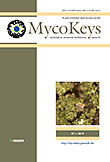
MycoKeys
Fostering collaboration in the fascinating realm of fungi.MycoKeys, published by PENSOFT PUBLISHERS, is a leading open-access journal dedicated to advancing the understanding of fungal biology and its diverse implications within agricultural, ecological, and biological sciences. With its ISSN 1314-4057 and E-ISSN 1314-4049, this journal has achieved remarkable academic prestige, reflected in its 2023 Scopus rankings placing it in the first quartile (Q1) across several categories, including Agricultural and Biological Sciences (miscellaneous), Ecology, Evolution, Behavior and Systematics, and Plant Science. MycoKeys provides a platform for researchers, professionals, and students interested in the latest findings and methodologies regarding fungi, their environments, and their interactions within various ecosystems. Since its transition to open access in 2011, the journal has championed the dissemination of high-quality research to a global audience, fostering collaboration and innovation in mycology. With a publishing history that converges from 2015 to 2024, MycoKeys remains a vital resource for those committed to exploring the multifaceted roles fungi play in our world.
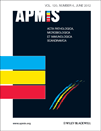
APMIS
Exploring the Frontiers of Immunology, Allergy, and PathologyAPMIS is a distinguished academic journal published by WILEY that serves as a vital resource for researchers and practitioners in the fields of Immunology, Allergy, Microbiology, and Pathology. Established in 1988 and continuing its mission through 2024, this journal facilitates the dissemination of high-quality research findings, contributing to the intersection of multiple disciplines within the medical sciences. With an ISSN of 0903-4641 and an E-ISSN of 1600-0463, APMIS is categorized in 2023's Q2 and Q3 quartiles across various domains, reflecting its significant impact, with rankings such as #50/208 in Pathology and Forensic Medicine and #121/233 in Immunology and Allergy. Although it currently does not offer open access options, the journal’s rigorous peer-review process ensures that published articles maintain the highest standards of scholarship. With its focus on innovative research, APMIS continues to occupy a pivotal role for those seeking to advance their expertise and contribute to scientific dialogue in these essential fields.
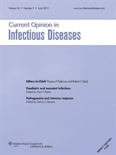
CURRENT OPINION IN INFECTIOUS DISEASES
Navigating Complexities in Infectious Disease ResearchCURRENT OPINION IN INFECTIOUS DISEASES, published by Lippincott Williams & Wilkins, is a premier journal that focuses on the latest developments and understanding in the field of infectious diseases. With its ISSN 0951-7375 and E-ISSN 1473-6527, this journal has gained recognition for its pivotal role in advancing knowledge from 1988 to its current publications in 2024. Boasting an impressive Q1 ranking in both Infectious Diseases and the Medical Microbiology category, it holds a reputable position among the top journals in the field. The journal serves as an essential resource for researchers, professionals, and students alike, providing them with timely reviews, analyses, and perspectives that shape contemporary practice and policy. While lacking open access options, it ensures a critical examination of emerging trends and unique insights that foster informed discussions. With its consistently high impact factor, CURRENT OPINION IN INFECTIOUS DISEASES remains a vital platform for thought leaders and innovators navigating the complexities of infectious disease research.
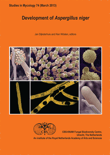
STUDIES IN MYCOLOGY
Unraveling the Mysteries of Fungi and Their EcosystemsSTUDIES IN MYCOLOGY is a premier journal dedicated to advancing research in the field of mycology, published by the renowned WESTERDIJK FUNGAL BIODIVERSITY INSTITUTE. With an impact factor that places it in the top quartile (Q1) of both Agricultural and Biological Sciences and Plant Science categories, it holds a prestigious position in the scientific community, ranking #1 out of 193 in its field as per Scopus metrics. Since its transition to Open Access in 2008, it has made significant strides in disseminating high-quality research widely, fostering a greater understanding of fungal biodiversity and its ecological impact. Covering a broad spectrum of topics related to mycology, the journal aims to provide researchers, professionals, and students with a platform for sharing innovative findings, stimulating academic discourse, and promoting collaborative efforts within this vital area of study. Hailing from the Netherlands, STUDIES IN MYCOLOGY serves as an invaluable resource for exploring the complexities of fungi, their interactions with various ecosystems, and their practical applications in agriculture and beyond.

Emerging Microbes & Infections
Elevating global health through open access research.Emerging Microbes & Infections is a premier open access journal, published by Taylor & Francis Ltd since 2012, dedicated to advancing the understanding of microbial infections and their implications in human health. With an impressive Q1 ranking across multiple categories—including Drug Discovery, Epidemiology, Immunology, and Infectious Diseases—this journal is at the forefront of research in the microbiological sciences. Covering a diverse range of topics, it serves as a vital resource for researchers, healthcare professionals, and students alike. The journal's commitment to open access ensures worldwide dissemination of cutting-edge findings, fostering collaboration and innovation in tackling challenges posed by emerging infections. As part of the thriving academic community in the United Kingdom, Emerging Microbes & Infections plays a crucial role in shaping the future of infectious disease research and public health.
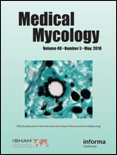
MEDICAL MYCOLOGY
Bridging Science and Clinical Practice in MycologyMEDICAL MYCOLOGY, published by Oxford University Press, is a premier journal dedicated to the study of fungal infections and their clinical implications. With an ISSN of 1369-3786 and an E-ISSN of 1460-2709, this journal has established itself as a vital resource in the fields of Infectious Diseases and Medicine, holding a respectable Q2 ranking for both categories and a Q1 ranking in the veterinary sector in 2023. Spanning a rich history from 1962 to 2024, MEDICAL MYCOLOGY serves as a platform for innovative research, case reports, and review articles that contribute to the understanding and management of mycological diseases. The journal's commitment to advancing knowledge is reflected in its Scopus rank of #120 out of 344 in Medicine - Infectious Diseases, positioning it within the 65th percentile. With open access options available, it aims to ensure that critical research is accessible to a global audience, enhancing collaboration and knowledge sharing among researchers, healthcare professionals, and students alike.

FUNGAL DIVERSITY
Unveiling Nature's Hidden Kingdom: Fungal InsightsFungal Diversity is a premier academic journal dedicated to advancing the science of mycology, encompassing ecological, evolutionary, and biological research involving fungi. Published by Springer, this journal has established a significant presence in the academic community since its inception in 1998, and it continues to thrive with a convergence period extending to 2024. Holding a prestigious Q1 ranking in several categories — including Ecology, Ecology, Evolution, Behavior and Systematics, and Plant Science — Fungal Diversity showcases cutting-edge research that influences ecological management, conservation, and biodiversity studies. With its notable positions in Scopus rankings, including being ranked #1 in Environmental Science - Ecology, the journal serves as an essential resource for researchers, professionals, and students interested in the complex interplay between fungi and their environments. Although it does not currently offer open access, interested readers can benefit from the journal's rich repository of peer-reviewed articles, making Fungal Diversity a vital component of the scientific literature landscape.
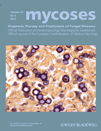
MYCOSES
Pioneering research for a healthier tomorrow.MYCOSES is a renowned academic journal published by Wiley, specializing in the fields of Dermatology, Infectious Diseases, and general Medicine, with a commendable focus on mycological research and its clinical implications. Established in 1957, this journal has significantly contributed to advancing our understanding of fungal diseases, offering a platform for high-quality research that ranks among the top in its categories—achieving Q1 status in Dermatology and Q1 in Medicine (miscellaneous), while maintaining a strong Q2 ranking in Infectious Diseases. With an impressive Scopus ranking of #5 in Medicine - Dermatology, MYCOSES occupies a pivotal position in the dissemination of critical findings and innovative practices within the scientific community. Although it is not an open-access journal, MYCOSES continues to attract a wide array of researchers, professionals, and students seeking to enhance their knowledge and keep abreast of the latest developments in mycology. Overall, MYCOSES not only serves as an essential resource for academia but also plays a vital role in shaping future research directions and clinical approaches to fungal infections.